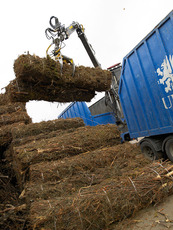Oct 20 2008
Michigan’s forest industry produces thousands of jobs and hundreds of thousands of tons of unused residues each year. Why not use that woody material to help generate clean electric power?
 Forest residues could help generate clean electric power
Forest residues could help generate clean electric power
That was one of the important questions Wolverine Power Cooperative asked Michigan Technological University professor Robert Froese and colleagues regarding the cooperative’s Wolverine Clean Energy Venture near Rogers City, Mich.
The answer, presented in a report to Wolverine, state legislators and representatives of Governor Jennifer Granholm, demonstrates the potential for homegrown biomass to reduce the use of fossil fuel while also decreasing carbon dioxide emissions from the generation of electricity.
“Neither inherent productivity nor environmental sustainability is holding back biomass production,” the Michigan Tech researchers concluded. “Clearly, Wolverine has the potential to take a leading role in the development of clean energy from biomass for Michigan.”
Brian Warner, director of environmental services for Wolverine Power Cooperative, was also encouraged by the results of this initial study. “Wolverine is excited about the potential for increased use of sustainable biomass for the generation of electricity for our Michigan-based members,” Warner said.
Unused logging residues and other material removed from timberland within 75 miles of Rogers City total about 220,000 dry tons per year, enough to generate at least 35 megawatts of electricity – the energy needed to serve 25,000 Michigan households.
Froese reported that only one-third of forest growth in the area is harvested. If forest land was utilized to its full potential, Wolverine could count on sufficient fuel from residues alone to produce enough electricity from the Rogers City plant to serve 75,000 homes.
Equally promising, the Michigan Tech researcher said, is the potential for using idle agricultural lands to grow energy crops, including switchgrass and fast growing trees such as hybrid poplar, silver maple, and European larch. Within 75 miles of Rogers City, there are nearly 500,000 acres of open land not being used for agriculture.
“The land is available, and it is good land for growing energy crops”, said Froese. “Also, idle land could be used without concern about competition with existing agricultural crops.”
Based on the findings of the report, Wolverine partnered again with Froese to install trial plantings this spring near the Rogers City area. These trials will help understand the optimum way to cultivate energy crops, by evaluating growth of a variety of tree species, different spacing of the species planted and various seedling types.
“While Wolverine and Michigan Tech have much more to learn, and Wolverine cannot commit to the use of biomass for the Wolverine Clean Energy Venture at this time, the use of biomass would clearly contribute to the local economy and is consistent with Wolverine’s environmental stewardship goals,” Warner said.
Other areas studied by Michigan Tech researchers included carbon dioxide emission reduction potential, environmental impacts, energy consumption, resource depletion and other implications of generating power entirely from coal compared to using 1 to 20 percent of various kinds of biomass. The use of biomass was the compared to other CO2 emission reduction options, such as geologic sequestration and improved forest management measures.
Michigan Tech found that using up to 20 percent biomass from logging residues offered the greatest potential CO2 and energy consumption reduction compared to geologic sequestration or reducing CO2 emission through forest stand management.
“Michigan has been blessed with an abundant forest resource. If managed wisely, this resource can help the state’s power companies reduce CO2 and other air emissions today while other promising technologies are developed for future, additional emission reductions,” Warner said.
Wolverine Power Cooperative is a not-for-profit generation and transmission cooperative headquartered in Cadillac, Michigan. Wolverine Power Cooperative is owned by and supplies wholesale electric power to six members: Cherryland Electric Cooperative, Grawn; Great Lakes Energy, Boyne City; HomeWorks Tri-County Electric Cooperative, Portland; Presque Isle Electric & Gas Co-op, Onaway; Spartan Renewable Energy, Cadillac; and Wolverine Power Marketing Cooperative, Cadillac.
Michigan Technological University is a leading public research university, conducting research, developing new technologies and preparing students to create the future for a prosperous and sustainable world. Michigan Tech offers more than 120 undergraduate and graduate degree programs in engineering, forestry and environmental sciences, computing, technology, business and economics, natural and physical sciences, arts, humanities and social sciences.